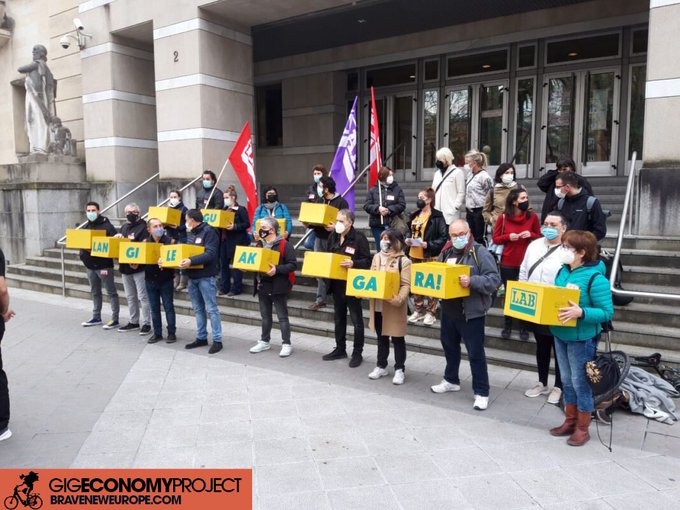Agreement is the first time digital platform workers in Spain have been included in a broader collective bargaining agreement, and could be a model to follow across the State after the passing of the ‘Riders Law’
The Gig Economy Project, led by Ben Wray, was initiated by BRAVE NEW EUROPE enabling us to provide analysis, updates, ideas, and reports from all across Europe on the Gig Economy.
This series of articles concerning the Gig Economy in the EU was made possible thanks to the generous support of the Foundation Menschenwürde und Arbeitswelt


Riders who deliver food in the hospitality sector have been included for the first time in a hospitality collective bargaining agreement in the Basque Autonomous Community (BAC), in northern Spain.
The agreement, signed on Monday [28 June] between the Basque unions ELA and LAB, the majority employers’ association in the BAC, the Basque Hospitality Federation and Confebask, is the first time that digital platform workers in Spain have been included in a broader labour agreement, and comes shortly after the passing of the Spanish Government’s ‘Riders Law’, which establishes a legal presumption that riders are workers, and not self-employed.
The agreement, supported by the ‘Riders for Rights’ network, means the riders will have a regulated salary of between €18,700 and €21,500 for full-time delivery workers and an annual working day of between 1,723 and 1,750 hours, as well as the application of the rest of the conditions of work established in the hotel and catering agreement.
ELA stated that the agreement was “a first step towards regulating the working conditions of the Riders through collective bargaining after the consideration of their employment relationship.”
A union spokesperson added: “ELA will push for starting salaries for the collective to be above €1200 per month. The precedent for this situation is the signing of the first agreement that ELA has signed with an absolute majority for supermarket delivery staff”.
ELA are also aiming to expand the agreement to include the region of Navarre.
Mikel ‘Betelu’ Alvarez, organiser of LAB Social, which organises precarious workers in the Basque Country, said the agreement was a “stepping stone to start negotiating for improved working conditions in the rider sector.”
He explained: “The basis is good, as it allows us to negotiate specialities in the framework of collective bargaining and to overcome the isolation and atomisation that home delivery workers were suffering from.
“If the first qualitative step was to get the workers out of the false autonomy and to include them in the general regime, this second step is part of the dynamic of the trade union struggle: to collectivise the problems of the sector, to organise the workers, to take up struggles and to provide collective solutions.”
It has been suggested that following the Riders Law food delivery workers may seek to be included in broader categories of work to become part of wider collective bargaining agreements, such as in logistics. Alvarez told the Gig Economy Project that the inclusion of riders within hospitality was because a precedent already existed at the level of the Spanish state, and therefore this could be a model to follow in other Spanish regions.
“It can be a model, it can lead the way,” Alvarez said. “It is the first time in the Spanish state that an agreement has been signed whereby digital platform workers are integrated into a broader agreement. In this case, we have opted for the hotel and catering agreement, as there was a precedent at state level: the signing of the Spanish Hotel and Catering Labour Agreement (ALEH) in 2019, where it was suggested that riders also formed part of this area.”
Digital platform employers have been given three months following the passing of the Riders Law to implement the new worker status, leading to union fears that the time is being used by platforms to root out unionised riders and establish a sub-contracting system which will ultimately degrade pay and conditions.
In May, a court in Bilbao ruled in favour of 300 riders having employment status with Glovo, the Spanish food delivery platform, forcing the company to make €343,814 in social security back payments to the Labour Inspectorate. The court ruling was the first of its kind in the Basque Country, but one of almost 50 across Spain which have ruled in favour of an employment relationship between riders and digital platforms.


Be the first to comment